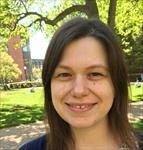2024 Sexual Medicine Research Fund Awards Announced
Beth Bragdon, Wendy Kuohung, Jai Marathe, and Ann Zumwalt have received 2024 Sexual Medicine Research Fund awards.
 Beth Bragdon, PhD, associate professor of anatomy & neurobiology, will establish whether skeletal stem cell populations and their transcriptional regulation is different between the sexes. Human bone marrow and periosteum will be used. These compartments of the bone have different primary roles, bone homeostasis and coupled remodeling or injury, respectively. These results will be the basis to understand how sex differences affect both homeostatic and injury repair within the skeleton and may provide novel therapeutic targets that are specific for males and females.
Beth Bragdon, PhD, associate professor of anatomy & neurobiology, will establish whether skeletal stem cell populations and their transcriptional regulation is different between the sexes. Human bone marrow and periosteum will be used. These compartments of the bone have different primary roles, bone homeostasis and coupled remodeling or injury, respectively. These results will be the basis to understand how sex differences affect both homeostatic and injury repair within the skeleton and may provide novel therapeutic targets that are specific for males and females.
 Wendy Kuohung, MD, associate professor of obstetrics & gynecology is teaming up with Lauren Wise, ScD, and Bernard Harlow, PhD, both professors of epidemiology, to prospectively characterize the preconceptional vaginal microbiome and its relationship to infertility and miscarriage in participants of Pregnancy Study Online (PRESTO), a cohort study of female pregnancy planners. Prior work showed feasibility of subject self-swabbing and that certain vaginal microbiome findings during the preconception period are associated with an elevated risk of subfertility and miscarriage. Additional patients from BMC will be enrolled to augment the racial and socioeconomic diversity of PRESTO.
Wendy Kuohung, MD, associate professor of obstetrics & gynecology is teaming up with Lauren Wise, ScD, and Bernard Harlow, PhD, both professors of epidemiology, to prospectively characterize the preconceptional vaginal microbiome and its relationship to infertility and miscarriage in participants of Pregnancy Study Online (PRESTO), a cohort study of female pregnancy planners. Prior work showed feasibility of subject self-swabbing and that certain vaginal microbiome findings during the preconception period are associated with an elevated risk of subfertility and miscarriage. Additional patients from BMC will be enrolled to augment the racial and socioeconomic diversity of PRESTO.
 Jai Marathe, MBBS, MS, assistant professor of medicine/infectious diseases, and her team are developing monoclonal antibody-based products that can prevent sexually transmitted infections as well as pregnancy. Complement proteins participate in a number of antibody mediated immunological functions such as cell lysis, opsonization/phagocytosis and chemotaxis. The researchers will measure complement levels and activity in vaginal secretions and study the diffusion and function of a contraceptive anti-sperm antibody (Anti-CD52g) in vaginal and cervical mucus.
Jai Marathe, MBBS, MS, assistant professor of medicine/infectious diseases, and her team are developing monoclonal antibody-based products that can prevent sexually transmitted infections as well as pregnancy. Complement proteins participate in a number of antibody mediated immunological functions such as cell lysis, opsonization/phagocytosis and chemotaxis. The researchers will measure complement levels and activity in vaginal secretions and study the diffusion and function of a contraceptive anti-sperm antibody (Anti-CD52g) in vaginal and cervical mucus.
 Ann Zumwalt, PhD, associate professor of anatomy & neurobiology, will determine the gender and sexual diversity (GSD) knowledge, attitudes and skills of clinical educators. Previous work by their group demonstrated that while school faculty value inclusivity in teaching, many are uncertain about how to appropriately frame GSD content and are therefore more likely to avoid these topics when teaching. The information from this current project will be used to design trainings and resources for educators in the clinical phase of the MD program curriculum.
Ann Zumwalt, PhD, associate professor of anatomy & neurobiology, will determine the gender and sexual diversity (GSD) knowledge, attitudes and skills of clinical educators. Previous work by their group demonstrated that while school faculty value inclusivity in teaching, many are uncertain about how to appropriately frame GSD content and are therefore more likely to avoid these topics when teaching. The information from this current project will be used to design trainings and resources for educators in the clinical phase of the MD program curriculum.
Congratulations!
View all posts